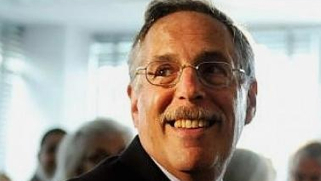Matthew Yglesias's Blog, page 2271
June 17, 2011
Unemployment's Toll On The Employed
By Matthew Cameron
Add this to the growing list of scary statistics related to the stalled economy: 28 million Americans who want to quit their jobs to pursue better opportunities, but are afraid to do so because of the poor labor market. As Bloomberg Businessweek puts it in an article running this week:
That's a lot of careers slowed and dreams deferred. At double the number of the 14 million unemployed Americans, it's also a huge swath of voters who may be in search of a Presidential candidate who they believe understands their discontent.
Making matters worse for Obama is the fact that most of those affected by this situation are young, up-and-coming workers who traditionally have been a reliably Democratic constituency. Mike Konczal had a good take on this back when the latest jobs data was first released. Essentially, the present situation is tremendously beneficial to existing managers because employees no longer have the bargaining position to extract concessions such as higher wages or improved working conditions. Managers and administrators tend to vote Republican no matter what, so Obama shouldn't expect a surge of support from this bloc for his inability to adequately address the employment situation. But what he should fear is that young professionals will abandon his party if more isn't done to rapidly strengthen the economy and improve their prospects for career advancement.


For Easing, Against Quantitative
When I was talking to Mike Konczal before our monetary policy panel, I mentioned that I actually think "quantitative easing" isn't such a hot idea but I'm leery of saying so since I think it's difficult to make the point in a clear way. But as David Beckworth explains here, the problem with QE isn't the "easing" it's the "quantitative."
To understand why you have to start with the little-understood question of what's "quantitative" about "quantitative easing." And to understand that you have to go back to what conventional monetary policy looks like. You typically see conventional monetary policy moves reported in the press as something like "the European Central Bank raised interest rates 0.25 percentage points." But there's no knob in Frankfurt that Jean-Claude Trichet turns to change the point at which the interest rate is set. What happens is that a central bank sets a target for where it wants short-term rates to be, and then it conducts "open market operations" (i.e., the buying and selling of bonds) to hit the target. QE differs in that it targets it a different set of rates—longer term interest rates when the short-term rate has gone close to zero. But it also differs in that instead of specifically picking a target number and then promising to do what it takes to hit the target, the central bank specifies a quantity of money that will be spent purchasing assets.
I have quite literally no idea why the Federal Reserve has decided this is a good way to conduct monetary easing at a time of near-zero rates. The downsides are enormous, ranging from the arbitrary fixation on round numbers to introducing confusion in the eyes of the public. The right approach is to set a goal, a state of the world that you want to achieve, and then promise to conduct whatever open market operations are necessary and proper to achieve the goal.


Recess Appointments And The Fed

At Dan Pfeiffer's talk this morning at Netroots Nation, he seemed to express the view that it's not possible to use recess appointments to fill vacancies on the Federal Reserve Board of Governors. This is, to the best of my knowledge, false. Doing a Fed recess appointment would be unusual but this Congressional Research Service document (PDF) on recess appointments indicates that Ronald Reagan did it. What's more, it indicates that the controversy that step created had some useful consequences:
On May 31, 1984, President Reagan nominated Martha R. Seger to be a member of the Board of Governors of the Federal Reserve System. The Senate Banking Committee had held four days of hearings and approved her nomination by the close vote of 10 to 8. A spirited floor debate was expected, but that was foreclosed when Reagan gave her a recess appointment on July 2 after Congress took a three-week break for the Fourth of July holiday (from June 29 to July 23). Senator William Proxmire, chairman of the Banking Committee, accused Reagan of abusing his recess appointment powers and promised to devise remedies that would restrict the President's authority. Lawmakers also objected to other recess appointments made by Reagan.
On August 8, Senator Max Baucus offered an amendment to a supplemental appropriations bills, calling on President Reagan to withdraw the recess appointment for Seger. The Senate voted 53-43 to table the amendment. A day later, Senate Minority Leader Robert C. Byrd introduced a Senate resolution (S.Res. 430), stating that it was the sense of the Senate that the power to make recess appointments should be confined to situations in which the Senate has formally terminated a session or in which the Senate will be in recess for longer than 30 days. That resolution was never put to a vote, but a year later the Senate passed a different resolution offered by Senator Proxmire (S.Res. 194), expressing the sense of the Senate that recess appointments should not be made to the Federal Reserve Board except under unusual circumstances, and only for the purpose of fulfilling "a demonstrable and urgent need" in the administration of the board's activities. The Senate also agreed to consider nominations to the board in an expeditious manner. The resolution was agreed to by voice vote.
On June 13, 1985, the Senate confirmed Seger by voice vote for a term expiring in 1998. On this occasion the Senate Banking Committee voted 11-4 for her confirmation. Although there was controversy over her recess appointment, there was never a question of using a funding restriction to deny appropriated funds for her salary. The Federal Reserve relies on nonappropriated funds to support its operations.
Not to prescribe any particular approach, but I think the general lesson here is that if you want to make progress on nominations you need to press forward. The Obama administration started its term by not making Fed nominations in a timely manner, they then never pressed publicly (or as far as I know privately) for speedy confirmation of their nominees, then they never publicly objected when Peter Diamond was blocked, then they declined to use (or threaten to use) their recess appointment powers, and they haven't publicly put forward any alternatives to Diamond. It's genuinely unclear how much of a difference the details of the composition of the Federal Reserve Board has made to policy outcomes, but at a minimum it's difficult to see how having more governors urging more stimulative action in place couldn't have made things at least a little bit better.


House Agriculture Committee Slashes Nutrition For Poor Kids, Keeps Agribusiness Subsidies

This is a telling moment in priorities:
The Republican-led House voted to slash domestic and international food aid Thursday while rejecting cuts to farm subsidies. A spending bill to fund the nation's food and farm programs would cut the Women, Infants and Children program, which offers food aid and educational support for low-income mothers and their children, by $868 million, or 13 percent. An international food assistance program that provides emergency aid and agricultural development would drop by more than $450 million, one-third of the program's budget. The legislation passed 217-203. [...] In addition to making spending cuts, Republicans in the House used the legislation to express dissatisfaction with a number of Obama administration policies, including healthier eating initiatives championed by first lady Michelle Obama as part of her "Let's Move" campaign.
Commentary outsourced to Alex Tabarrok who notes that "anyone who argues against making school meals healthier because it's too expensive at the same time as they vote for keeping billions of dollars in farm subsidies is not concerned about expenses. What unites the bill is not ideology but protection of agribusiness."
This vote also tells us a lot about the longer-term implications of the House GOP's drive to turn Medicare into a heavily means-tested program.


College Beyond The Smorgasboard

By Matthew Cameron
Anyone involved in higher education knows that the field is facing a perfect storm of challenges, and this column by Professor William G. Tierney in the Chronicle of Higher Education touches on a number of those issues. In particular, he argues that large lecture classes "are taking on the feel of online learning" and are causing students to become disengaged with their learning, a concern that recent research substantiates.
Tierney's solution, however, misses the point:
The curriculum-as-undergraduate-buffet should be replaced with a pared-down list of offerings geared toward the advancement of the intellect and the acquisition of skills needed in the 21st century. (To satisfy a bachelor-degree requirement for science, my friend took a class on earthquakes, a class on life science—read: good eating habits and personal hygiene—and one on astronomy.) We have to decide what students should learn and then offer courses that will enable them to achieve the goals we have set. The smorgasbord that currently exists is inefficient, ineffective, and meets the whims of the faculty rather than the needs of the students. As it stands now, we assume that sitting in a lecture class and earning credits is a proxy for learning. A streamlined, stripped-down curriculum would help free up professors' time to get to know their students.
Cutting down on course offerings won't solve the issue of overcrowded lecture halls unless sections of popular, skills-oriented classes are expanded to replace the disappearing courses in fringe disciplines. That will require additional resources – which state governments seem unlikely to provide — since professors teaching "21st century" subjects such as economics, business and computer science earn more than those in the fields they would be replacing. Moreover, it fails to address other problems such as grade inflation and the erosion of the liberal arts curriculum that have contributed to the decline in students' analytical learning while in college.
Instead of trying to reengineer the purpose of college toward providing kids with job skills, it might be time to consider more efficient ways to provide those job skills. As Tierney points out, large lecture classes offer little beyond what students can obtain in community colleges or online courses. Therefore, individuals who want to forgo the non-skills oriented liberal arts component of higher education should be encouraged to opt for those more affordable alternatives. This will both free up resources at traditional universities and will reduce the financial pressures put on students seeking to improve their credentials. In the latter case, it could enable those students to become more engaged with their studies since they no longer will have to work 30-hour-per-week jobs just to pay their way through school.


Speeding Transition Away From Employer-Based Health Care Is a Good Idea

Senator Ron Johnson and former CBO Director Douglas Holtz-Eakin have a Washington Post op-ed that builds on a discredited McKinsey study claiming that some huge share of American employers are planning to take advantage of the Affordable Care Act to reduce their labor costs and improve their workers' access to health care. I'm reliably informed that this isn't actually the case, and the opportunity to improve the business climate and workers' health care outcomes isn't nearly as available as Johnson/DHE say. But it's worth taking note of their scare story to recognize how un-terrifying this is:
The other of us, as a former businessman, knows what it's like to purchase coverage for employees. There are many employers who would happily get out of the practice of providing health insurance, if they could do it without hurting their workers. Obamacare will encourage them to do so. In the current system, most employers are highly reluctant to drop health coverage for employees because they don't want their workers to be financially exposed. But under Obamacare, instead of paying $15,000 for family coverage, an employer can choose to pay a $2,000 fine, pay more in cash wages, make his employees eligible for a huge government subsidy and come out ahead. Confident that their employees are also gaining, millions of employers will follow this logic.
The reason we're supposed to find this scary is that it means the cost of the Affordable Care Act will go up since there will be more ACA tax credits to buy insurance on the exchanges. That's true, but it ignores the fact that employer-provided health insurance benefits are already subsidized because they're not taxed as income. We'd be replacing one form of subsidized insurance for another form of subsidized insurance. The real difference here isn't in the availability of subsidies, it's just in the form of the insurance options available to people. Health insurance exchanges will offer a larger overall risk pool that will be better able to perform the basic insurance function. They'll also expand the range of options available to people. In an exchange, an insurance company needs to sell insurance to you. Right now, an insurance company needs to sell insurance to your employer's HR director.
Pulling out, this is to me an example of the kind of phoniness of a lot of the debate over the ACA. Back when Holtz-Eakin was running policy for John McCain's campaign, their proposal for health care reform was to rescind the tax subsidy for employer-provided health insurance and replace it with a tax credit that would go to directly to workers. In other words, to implement exactly the kind of shift in health care financing that they're now warning against. The difference is that the McCain plan would have dumped people into an unworkable un-regulated market for individual purchase of health insurance while the ACA will create a workable risk pool. Now that's not to say that DHE has no real objections to the way the ACA pulls this off. He probably thinks the subsidies are too generous, and that the revenue base for the ACA is too progressive. Conservatives generally prefer stingier programs and dislike progressive taxation. But it would be much healthier to just have that debate, which is a kind of banal quantitative left vs right argument. Instead, we seem stuck in this dialogue of fake objections and weird scare stories.


The Limits And Importance Of Campaign Finance Reform

Russ Feingold uncorked a major speech last night at Netroots Nation focusing on his longtime themes of campaign finance reform warning of the brave new world of Citizens United and Super PACs. I have to say that reviewing the thoughts of such a hardcore campaign finance reformer mostly reminded me of my longtime skepticism about this cause.
My starting point is that the "money isn't speech" mantra clearly has some real problems with it. It's true that a law saying "Noam Chomsky can't publish anymore books" isn't the exact same thing as a law saying "Nobody can pay money to buy a Noam Chomsky book or donate money to non-profit institutions that employ Noam Chomsky." But that's still an effort to censor Noam Chomsky. Right? Money isn't speech, but we're talking about enacting regulations whose purpose is to limit people's ability to disseminate Noam Chomsky's ideas. Shifting the law to make it less Chomsky-focued makes it less unfair. We could have an even-handed rule prohibited the sale or financing of foreign policy commentary in general. But making the rule fair and agent-blind in that case also means it's a more draconian censorship regime.
The issue, most broadly, is that money is a big help when communicating with the public. Restricting a person's ability to obtain money for the purpose of communicating with the public is a means of restricting that person's ability to communicate. It is true that this means that people with more money have a disproportionate impact on the public dialogue just as they have disproportionate access to big houses and fancy dinner and quality medical care. And you don't have to be happy about any of those facts. But they're part of a general question of inequality and economic justice.
Now on the pro-reform side, what I will say is that even though you can't just waive away free speech objections by saying that "money isn't speech" you can certainly restrict the permitted activities of certain kinds of corporate forms. Least controversially (for now) a non-profit organization that wants to be eligible for tax-exempt status can't be primarily engaged in political activities. That's fine by me. Publicly traded corporations are already required to engage in lots of different kinds of financial disclosure, and beefing up disclosure requirements about political spending would be a very reasonable extension of that. People with a sincere effort to somewhat restrain the influence of big business over the political process should be able to come up with any number of ways of doing so that don't run afoul of free speech and don't rely on implausible claims about the vast metaphysical gap between money and speech. But it's still the case that money is useful when you're trying to communicate, so people with more money will have an advantage in the communications sphere unless you engage in really problematic curtailments of freedom.


Building Better Rat Brains

I had a friend in college who spent a lot of time dissecting frozen rat brains (or something), which I always thought was funny but she swore was part of important neurological research. Today, though, I see that rat brain research is indeed paying off with scientists announcing verifiable improvement in rat memory:
Though still a long way from being tested in humans, the implant demonstrates for the first time that a cognitive function can be improved with a device that mimics the firing patterns of neurons. In recent years neuroscientists have developed implants that allow paralyzed people to move prosthetic limbs or a computer cursor, using their thoughts to activate the machines. In the new work, being published Friday, researchers at Wake Forest University and the University of Southern California used some of the same techniques to read neural activity. But they translated those signals internally, to improve brain function rather than to activate outside appendages.
"It's technically very impressive to pull something like this off, given our current level of technology," said Daryl Kipke, a professor of bioengineering at the University of Michigan who was not involved in the experiment. "We are just scratching the surface when it comes to interacting with the brain, but this experiment shows what's possible and the great potential of interacting with the brain in this way."
The initial idea here seems to be that if you could make this technology workable for human patients that it could treat dementia. And certainly breakthroughs in aging-related illness would be a huge win for a world that's going to have a much higher share of elderly people thirty years from now than it does today. But I also think this general line of inquiry helps indicate why replacement of human beings with robots is somewhat less likely than people sometimes think. In the future, not only will we be able to build better machines, we'll be able to build better human beings.


Breakfast Links: June 17, 2011
— Urban farming is ecologically dubious.
— Syrian troops seize new town.
— Members of congress working to avoid disclosure of campaign donations by government contractors.
— Obama trails generic Republican.
— House moves to cut agriculture programs.
— AARP open to Social Security cuts.
— Laurent Kabila likely to win re-election in Congo with a smallish plurality.
— Global regulators move to impose tougher capital rules on giant banks.
— Shrooming our way to happiness.
— Brad DeLong's macro overview.


June 16, 2011
Don't Double Down On a Failed Approach To Pakistan
By Matthew Cameron
Following a spate of bad news out of Pakistan, Bloomberg View published an editorial today that argues for a revised framework to U.S.-Pakistani relations. The thesis of the argument is simple: "The U.S. has relied on a combination of about $20 billion in aid and empty threats over the past decade to persuade Pakistan to end its destructive behavior. This policy hasn't been successful because it has been resisted by key Pakistani military and intelligence leaders."
So what is the authors' solution? More aid and empty threats!
President Barack Obama could dispatch [Admiral Mike] Mullen to Islamabad with a strong message designed to persuade Pakistan to change course: In exchange for demonstrable efforts by Islamabad to crack down on terrorists and insurgents on its territory, the president would fight for additional military and economic aid, as well as increased access to the U.S. textile market….
And Pakistan should also be made to understand that a failure to change paths could lead to closer U.S. engagement with India. This could include encouraging greater Indian involvement in sensitive areas in Afghanistan. More importantly, Mullen could emphasize that intransigence will mean that the U.S. can no longer treat Islamabad as a friend. Such a change would have inevitable consequences: First, it would make it difficult, if not impossible, to dissuade India from retaliating if it were attacked by Pakistani-backed terrorist groups, as the U.S. did after the 2008 terror strikes in Mumbai. Second, should the U.S. be asked by India for assistance to identify and locate the perpetrators of a future attack, it would be difficult to turn down the request.
This hardly seems to represent a substantive change in the U.S. approach to dealing with Pakistan. For years, the U.S. has tied aid to the promise of improved cooperation from the Pakistani military in fighting terrorists. Yet this still hasn't gotten the U.S. beyond the point where officials are unable to even share basic information with the Pakistani regime about upcoming anti-terror operations. And unless the U.S. winds down the Afghanistan war, it can't really cut aid because it needs at least limited cooperation from Pakistan to carry on with the conflict.
As for bolstering U.S. support to India, that's easier said than done. In particular, it would be virtually impossible to promote additional Indian involvement in Afghanistan or endorse retaliatory strikes against Pakistan in case of a terrorist attack because either would seriously destabilize the region.
Obviously, it's much more appealing to believe that if the U.S. sends just one more delegation or makes its threats sound a little more convincing then Pakistan will suddenly change its behavior. But this ignores the underlying dynamics shaping Pakistani attitudes toward the U.S., as well as the factors constraining U.S. policy options in South Asia.


Matthew Yglesias's Blog
- Matthew Yglesias's profile
- 72 followers



